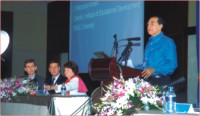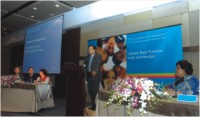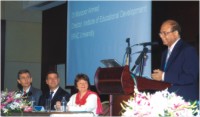Feature

Mahdin Mahboob & Feeda Hasan Shahed
Education is the most powerful weapon which you can use to change the world.
- Nelson Mandela
 The University of Cambridge International Education Sytems has been providing quality and affordable education worldwide for a long time now. On Saturday, 8th September the University of Cambridge organized the first International Education Conference at Radisson Hotel, Dhaka. Participated by Principals, Head Teachers and other Senior Teachers of 35 different English Medium Schools of the country, the conference was titled 'Global Best Practice with Cambridge '. The University of Cambridge International Education Sytems has been providing quality and affordable education worldwide for a long time now. On Saturday, 8th September the University of Cambridge organized the first International Education Conference at Radisson Hotel, Dhaka. Participated by Principals, Head Teachers and other Senior Teachers of 35 different English Medium Schools of the country, the conference was titled 'Global Best Practice with Cambridge '.
Speaking at the conference, H. E. Anwar Choudhury, the British High Commissioner to Bangladesh, said that without English language skills, students in Bangladesh risk being 'blind and deaf' in the global knowledge base.
Although the cyber knowledge base would become increasingly multi-lingual, resources in Bangla or Chinese languages would never match that in English.
Identifying access to and quality of education as the big 'issues', he said that when teachers do not provide quality education, they cheat students out of their lives.
'Quality education is very much needed to tackle terrorism,' said Anwar. He also said that Bangladesh should emphasise the importance of English medium education to ensure its progress.
 While answering a question after his formal speech, the High Commisioner said that 'English is the passport to the global economy.' While answering a question after his formal speech, the High Commisioner said that 'English is the passport to the global economy.'
Mahfuz Anam, the editor and publisher of The Daily Star spoke on the 'Educational challenges in the 21st century'. He said that ethics are an essential component of education.
"A person devoid of ethics is devoid of education," he said, adding that teachers should nurture intellect and vigour, not prejudice, to ensure that a student's overall education is framed and upheld by ethics.
He added that it is the teachers' job to motivate and inspire students with enthusiasm for education to promote
innovation and creativity.
Yasmeen Murshed, the Chairperson of Scholastica School, said Bangladeshi educators cannot be swayed by 'only' global trends but should stay attuned to, and engaged with, the social, moral and cultural values of Bangladesh.
She stressed the need for educators to inculcate students with the values necessary for a lifelong education by focusing on ethics of equity and inclusion, human security, environmental consciousness and poverty alleviation.
 Yasmeen Murshed who is also a former adviser to the caretaker government, said teachers in Bangladesh should inform and engage students with knowledge of the region's historical roots, uniqueness of the country, political dynamics across borders and economic history, especially about the conditions of economic development here. Yasmeen Murshed who is also a former adviser to the caretaker government, said teachers in Bangladesh should inform and engage students with knowledge of the region's historical roots, uniqueness of the country, political dynamics across borders and economic history, especially about the conditions of economic development here.
After the Conference, we had an exclusive interview with Ann Putis, the Chief Executive of University of Cambridge International Examinations. Here are the excerpts.
Star Campus(SC) : How would you summarise the whole conference in a few words?
Ann Puntis(AP) : The main objective is to provide support to the teachers with upgraded curriculum and teaching techniques from renowned international experts.
Furthermore it was an excellent platform for delegates to build upon their expertise in the field of International Education. The conference covered three aspects, each demonstrating how CIE(Cambridge International Education) and its partners are playing a role in bringing Global Best Practice to education in Bangladesh.
SC: What exactly is 'Global Best Practice'?
AP : The concept reflects our commitment to develop successful students by equipping teachers with the tools to provide the best educational experience. We hope the Principals and Head teachers will benefit from the conference and workshops.
SC : We have been hearing a lot about how this system will be benefitting the good students. What happens to the average students?
AP : Not everyone is necessarily a good student and posses the standard merit for education but we have different syllabi for them with adoptable teaching material.
SC : Is there any waiver in exam for poor but meritorious students?
AP : Our organization is a charitable foundation, so we offer lowest cost for the wider society. We work with seventeen governments where we are working on Skill Developmnent, different Government Contracts and projects and it is to be noted that some of those countries GDPs are quite less than Bangladesh. We work in order to increase the access to high quality education. In doing that we find professional satisfaction.
SC: Is the expense suitable in Bangladesh perspective?
AP : Like I said that we have been working with countries that have a lower GDP than Bangladesh, it is obviously cheaper and affordable.
SC: In many developing countries like ours, we have different education systems existing simultaneously. But all the students, from different backgrounds, end up in the same jobe market and environment. Doesn't this create a problem for possible employers and the employees themselves?
AP : Well, to be specific, in job sectors, students with UK education system background and from other countries with different educational background are not evaluated separately. Being an employer myself, we find the right person for the job with the right attitude and with right problem solving abilities a person who can apply his or her knowledge.
SC : What will be the difference in the conference attendees before and after the conference?
AP : Cambridge is the largest provider of quality education, local culture and heritage. After attending the conference the teachers will be benefited to teach and learn practical science that would interest both the teachers and students. They would have up-to-date knowledge about teaching materials and ways of modern teaching in the classroom.
SC: Do Bangladeshi students also get to learn about their own country and culture?
AP: The thing is that we have a variety of syllabi and we ask the students to choose. We have Islamic Studies; it's about promoting flexible system. In the elementary level, schools and parents will choose for them. I get a lot of complain for not having Bangladeshi History and Geography in our syllabi. But it isn't true. We have Bangladesh Studies as a subject and we want to say that we are very committed to local culture.
| 